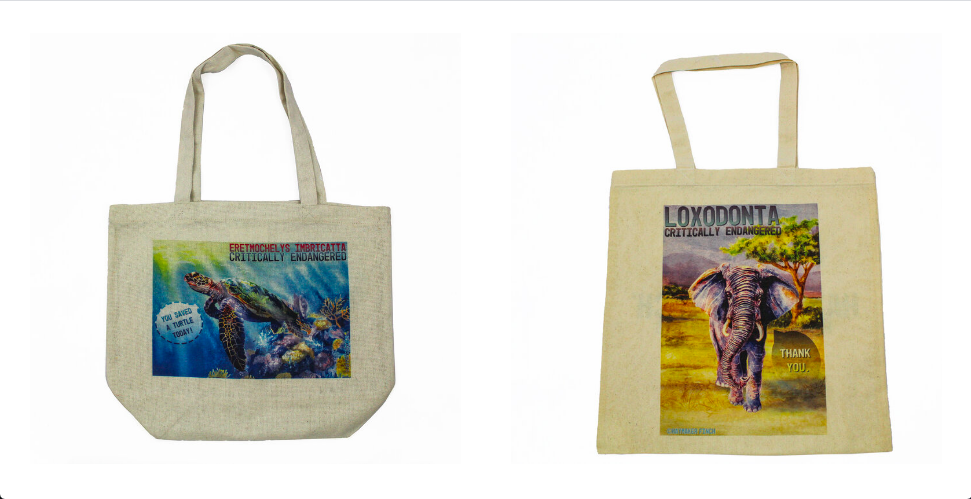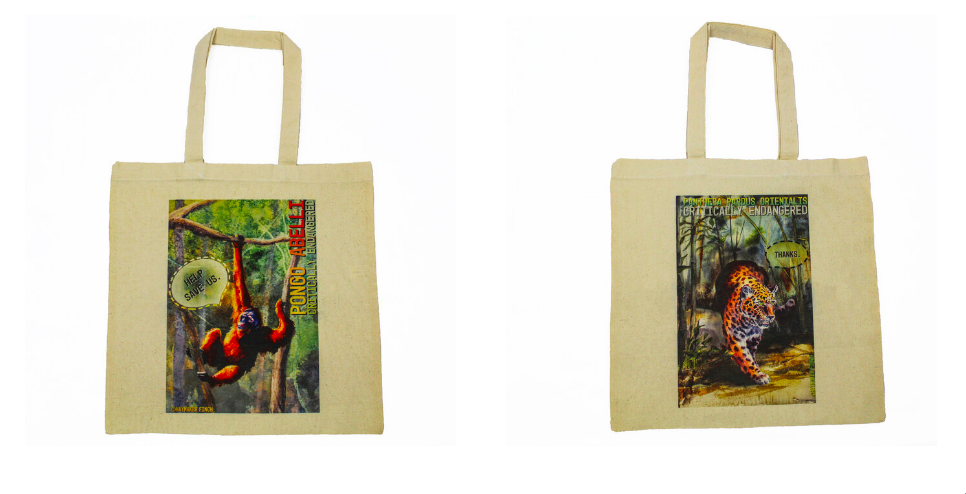Class of ’17 Mills alum Audrey Simpson recently launched Haymaker Finch, a fashion brand dedicated to educating people about conservationism and working towards poverty alleviation. She graduated from Mills with a Masters of Business Administration (MBA) and launched her business in March of this year. She works with Martha Iserman, an artist and professional science illustrator who creates the artwork. Simpson approaches sustainability as an international issue and strives to make an impact on a global as well as local scale.
“One thing I really want to be able to bring with my brand is an increased awareness of what is happening to the environment on a global scale. So these wildfires that we’ve seen absolutely decimate portions of California, what happened in the Amazon, what happened in Australia, that’s not natural,” Simpson said. “I want for people to understand that there is a direct connection between what we are consuming as just everyday Americans, to have access to food and water and all of the … unnecessary goods that we use, and what’s happening to the environment.”

Simpson emphasizes that the impact of pollution can be seen internationally, and as global warming increases, it is important for there to be more education around incorporating conservationism in people’s everyday lives. She believes that when people learn more, they will be able to make their own decisions on how to gear their lives towards sustainability.
“I think it’s really easy to not understand the direct impact of your actions because you don’t necessarily see it on a day to day basis,” Simpson said. “I want for companies to start to push it into people’s spaces. That’s part of being a responsible business.”
There is a distinct lack of transparency between businesses and consumers on the exact contents of certain merchandise and where the items will go once discarded. Simpson believes that if people are more educated about how the Earth is negatively impacted by things such as plastics and fast-fashion, then they will want to live more sustainably.
“It falls on these massive organizations to have this level of responsibility because they are the ones who are responsible for a majority of the waste that we see in the world. So the plastic bag that … my bread comes in, that came from a company that decided that they should put their products in a plastic bag. If they were willing to change their plastic bag to a paper bag, then that would be X amount of waste less that we see in the world,” Simpson said. “I myself am not manufacturing plastics and then throwing it away. It’s coming from some organization that is producing it. And so because these organizations are creating the bulk of this material, that then goes on to be thrown away, discarded, and then it winds up impacting the environment.“
Haymaker Finch stands out from many fast-fashion brands as their merchandise is listed accurately with its’ contents and production location. Currently, their website lists four totes, one of which was created using 100% sustainable recycled cotton. Simpson aims to outsource recycled materials for the designs to reduce her impact on the environment. While the other totes are made from 100% cotton, she is very conscious about how she produces her merchandise.
“My intention moving forward is to make sure that all of the products that I source are from recycled material. So I absolutely have that intention in my mind and with anything else that I launch. … What I’m doing is making sure that I produce in very small batches to eliminate waste,” Simpson said.
Her day job as an inventory planner for major retailers has given her the knowledge and experience needed to understand inventory management and sourcing practices. She compares her smaller production quantity at Haymaker Finch to the practices of large fast-fashion retailers, where there is a cycle of merchandise made quickly in mass quantities to keep up with new trends. Ultimately, as clothes become out of season, they are either destroyed or discarded into a landfill.
According to the United Nations Environment Program, 20% of global wastewater and 10% of global carbon emissions can be accounted to the fashion industry. As people become more aware of the ways fast-fashion pollutes the environment, brands like Zara and H&M are fighting to maintain the attention of their consumers through launching fashion lines that claim to be sustainable.
“It’s really tough to know exactly what your favorite brands are doing in terms of sustainable efforts. A lot of them … will mask their true intentions behind buzzwords like ‘sustainability’, ‘eco friendly,'” Simpson said. “And what does that really mean? What portion of their products are truly worthy of these labels? It’s really tough to know that for certain unless they’re being 100% transparent like brands like Everlane or Allbirds, for example.”
Everlane is a fashion company that is open about the materials and production location of each piece of clothing. Simpon has seen the positive responses from consumers to this effort of transparency and believes that people feel satisfied knowing they are buying from a business that is both socially and environmentally responsible. As a new entrepreneur, Simpson aims to provide the same effect on consumers of Haymaker Finch.
Her interest in conservationism and poverty alleviation pre-dates her time at Mills to when she was an undergraduate at California State University, Sacramento (CSUS), where she completed a degree in International Relations and a minor in Peace and Conflict Resolution Studies. She also served as the treasurer of the Peace and Conflict Resolutions Club. Initially, Simpson intended to pursue microfinance, a banking system that gives marginalized, low-income communities the opportunity to acquire a loan and become financially self-sufficient.
At CSUS, Simpson was immersed in an environment where people were very engaged in conversation around the connection between international affairs and global economic development. She became an active participant in the school’s Model United Nations assemblies.
“We were presented with these really interesting challenges about how we promote education across the globe, how we promote health and poverty alleviation. So I was just immersed in … this world, I was having really interesting conversations with people who were so passionate about these topics that I myself became quite passionate about them as well. And I just think that that … always stuck with me. How easy it feels to be privileged in the United States,” Simpson said. “Whereas the people who are in the developing world, they sustain themselves on so much less. What could they do if they had a fraction of my income? What could they do if they had access to the same food or water or a steady stream of health care that I have access to? That’s where my interest in this poverty alleviation environment conservationism came from.”
When she arrived at Mills in 2015, Simpson was immersed in a new environment where many students she met were interested in entrepreneurship. Her idea for Haymaker Finch stemmed from the combination of her passion for poverty alleviation on a global scale and becoming an entrepreneur.
Simpson has worked in inventory for many major retailers in San Francisco, and while she has gained valuable experience, she feels that there are not many large corporations that share the values of newer, smaller businesses. Businesses like Everlane and Allbirds seem to be paving the way, and Simpson hopes to bring conservation awareness fully to mainstream media.
“I think that there are elements of what I’m doing that we’ve seen before but what I’m trying to build is a little bit different, because I really hope that I can make this a company that is as big as Nike, Adidas and Supreme, but with a mission that is very deeply grounded in conservation. I want to get to that point while maintaining this mission the entire time,” Simpson said.
As she continues to grow her business, she continuously adapts to her role as an entrepreneur. Earlier this year, she had plans to attend open-air markets to increase awareness around her brand and mission; due to COVID-19 shutdowns, these plans have been postponed until further notice. This has caused some trouble for Simpson, being an owner of a small business, as speaking with people is one of the ways she works to inform people about Haymaker Finch. However, in the meantime, she maintains her focus while working on connections and collaborations from home.
She is working on a future collaboration with Iserman to create a clothing line that illustrates the impact of environmental deterioration on animals.
Despite the uncertainty of these times, Simpson remains dedicated to fulfilling her mission. She is motivated by her own ambition to be successful and by her parents, who are from West Africa.
“I have this drive to just keep going, no matter what. I call it grit. It’s something that I’ve always had. Something doesn’t work out, I just try again,” she said. “But at the same time, I’m also really motivated by my parents. … The life that [my mom has] been able to build for herself, that my dad’s been able to build, it’s just something that I feel I owe it to them to continue building on.”
You can catch updates from Haymaker Finch via Instagram and Twitter or visit the website.

“Conservationism is easy. It sounds like it’s a really big daunting endeavor, but it doesn’t have to be. When we all made the transition from plastic bags to taking their reusable bags to the grocery store, that was a step toward conservationism,” Simpson said. “And I don’t know if we celebrate enough wins like that, because my whole life I was using the plastic bags provided at the store, and now, all of a sudden, I would never do such a thing. So I want people to understand that every day we are making improvements and we should celebrate those wins. Because when we really reach a huge milestone, that’ll definitely be something to celebrate.”



